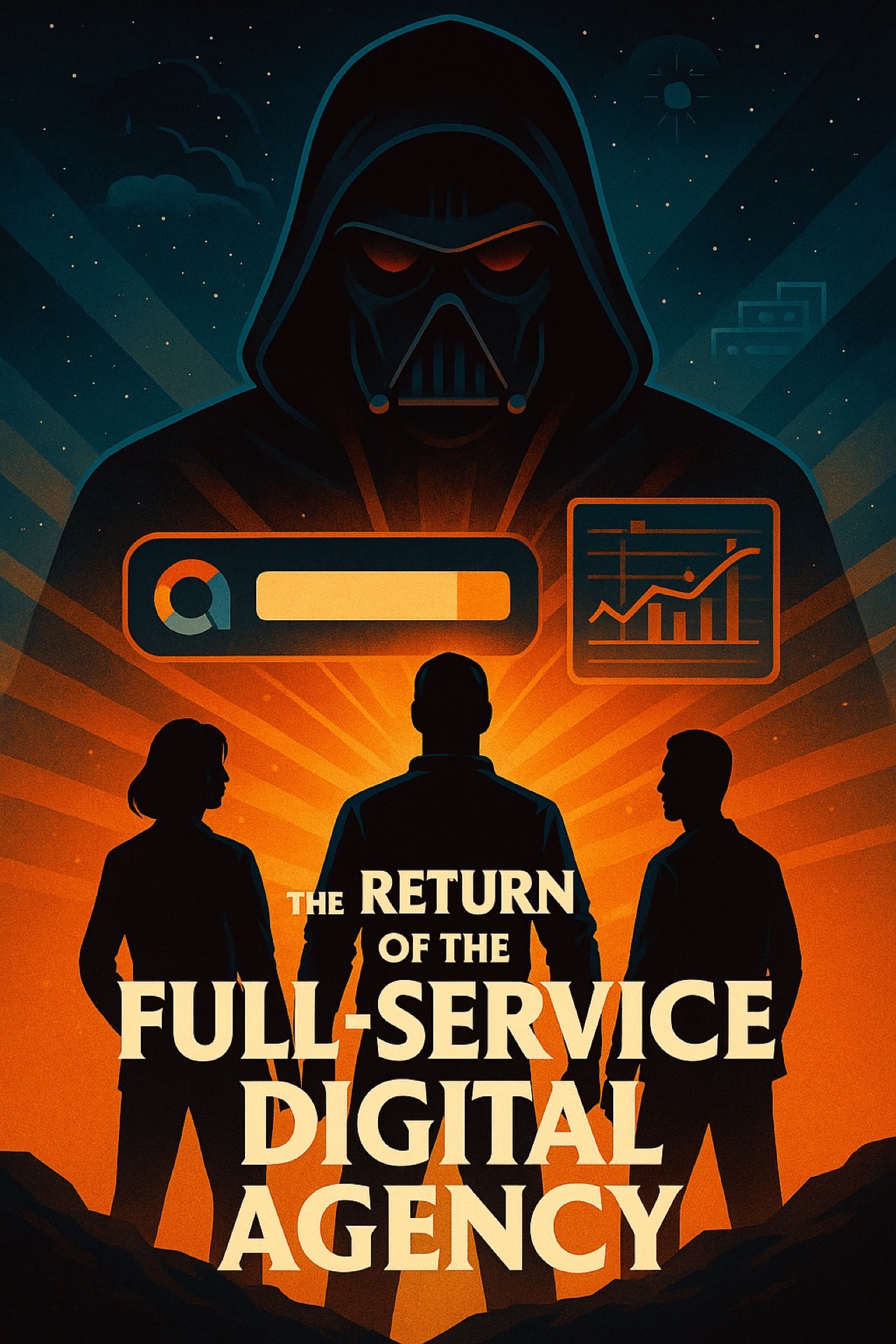The Return of the Full-Service Digital Agency?

Are We About to See the Return of the Full-Service Agency?
For the last decade, the rule in agency land has been simple: specialise or die.
We all heard it — and many of us lived it.
Be the best at one thing. Niche down. Own a single category — whether that was Wordpress, Drupal, Google Ads, Meta Ads, SEO or CRO.
The full-service agency model was for the old days.
“You’re just a jack of all trades, and a master of none!”
But what if that old model is exactly what clients are about to need again?
What’s shifting — and why it matters
Thanks to AI and automation, everything is getting faster, cheaper, and more chaotic.
Clients are drowning in tools, GPT wrappers, and one-click services — most of which promise to do the job better than a human ever could.
In some ways, they’re right. With no people involved, your costs don’t scale with revenue. Margins look beautiful on paper.
But here’s the problem:
👉 There’s no real relationship
👉 No one to filter the noise
👉 No one connecting the dots or asking the right questions
That’s where the real opportunity is starting to emerge.
The rise of the quiet generalist
More and more, I’m finding myself doing work outside the original brief.
Not because I pitched for it. But because clients trust me enough to ask:
“Can you help with this too?”
Sometimes it’s automation. Sometimes it’s AI. Sometimes it’s just a weird process thing they’ve been meaning to fix for months.
And I say, “Sure, I’ll have a look.”
Even if I’m not the most specialised or fastest - I’m honest and I can get things done.
That builds trust, and trust leads to momentum. Then suddenly I’m working across delivery, automation, team ops, tooling — and yes, sometimes AI.
Why though? Because when the client’s confident you’ll figure it out or tell them the truth if you can’t, they keep coming back.
The bar has moved (again)
There’s a line I read recently that stuck:
“If you wouldn’t remortgage your house to promote what you’re offering, your positioning isn’t strong enough.”
That hits had, because let’s be honest — the stakes have changed.
You’re not just competing with other agencies anymore. You’re competing with:
- A prompt in ChatGPT
- A DIY tutorial
- A curious client who’s willing to try
So if your work doesn’t feel undeniably better than what someone can cobble together themselves, that client is gone.
Why context is your edge
Let me give you a real example…
I recently spoke to a customer of one of my clients. They’d just had a new website built — and they hated it.
Not because it looked bad, but because their SEO agency told them it was full of technical issues.
Here’s what happened:
- They hired a dev team to build a marketing site.
- The devs delivered what was asked.
- The client went to an SEO agency post-launch.
- The SEO agency pointed out all the gaps.
The result was a confused and frustrated client.
Why? Because no one asked what the site was meant to do. The dev team stayed in their lane, the SEO team came in late, and no one connected the dots.
That’s the real risk of staying siloed. You don’t have to offer everything. But you do need to understand how your work fits into the whole.
➡️ If you’re building a marketing site, you should know the basics of SEO.
➡️ If you’re creating content, you should understand conversion.
Because if you don’t, someone else will. Or worse — the client will do it themselves and assume it’s good enough.
Here’s the thing: if the dev team had even surface-level SEO awareness, they could have delivered something far more effective — and walked away with a happier customer.
The real value is clarity, not code
The more AI point solutions flood the market, the more valuable actual human partnerships become.
Clients aren’t asking for more tools. They’re asking for clarity.
They want to know:
- What’s worth investing in?
- What’s a distraction?
- What actually works in practice?
That kind of guidance doesn’t come from clever positioning. It comes from trust. From being the person who shows up, solves problems, and speaks plainly.
It’s hard to scale. But it’s even harder to replace.
What to try next
If you’re running an agency with a couple of smart, curious, technically-minded people… try this:
👉 Ask your clients: “What are you trying to figure out right now — outside the services we already offer?”
👉 Be honest about where you’re still learning — and where you’re confident.
👉 Test things. Share what you find. Help them navigate the noise.
You don’t need to become a full-service agency on paper.
But if you’re the kind of partner who gets stuck in, asks good questions, and understands the bigger picture — you might already be one.
The future might not belong to the most specialised agency.
It might belong to the one that gives a damn — and shows up with curiosity, context, and keeps things focused.

